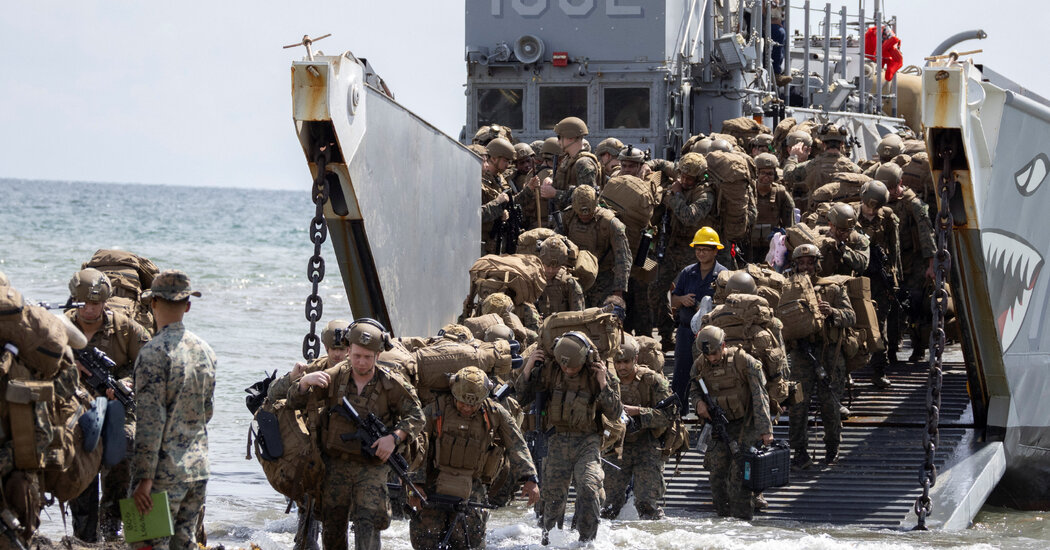The Justice Department told Congress this week that President Trump could lawfully continue his lethal military strikes on people suspected of smuggling drugs at sea, notwithstanding a time limit for congressionally unauthorized deployments of armed forces into “hostilities.”
In a briefing, the official who leads the department’s Office of Legal Counsel, T. Elliot Gaiser, said the administration did not think the operation rose to the kind of “hostilities” covered by the 60-day limit, a key part of a 1973 law called the War Powers Resolution, according to several people familiar with the matter.
In a statement provided by the White House, an unnamed senior administration official said that American service members were not in danger because the boats suspected of smuggling drugs were mostly being struck by drones far from naval ships carrying U.S. forces.
“The operation comprises precise strikes conducted largely by unmanned aerial vehicles launched from naval vessels in international waters at distances too far away for the crews of the targeted vessels to endanger American personnel,” the official said.
The U.S. military has killed about 62 people across 14 airstrikes on boats in the Caribbean Sea and eastern Pacific so far, and the administration has told Congress that Mr. Trump “determined” that the operation counts as a formal armed conflict.
But the stance that the operation does not count as “hostilities” because the people on the boats could not shoot back builds on a precedent established by President Barack Obama during the 2011 NATO air war over Libya, to significant disagreement at the time in Congress and within Mr. Obama’s own legal team.
The War Powers Resolution says that a president who unilaterally deploys U.S. forces into hostilities “shall terminate” the operation after 60 days if Congress has not authorized it by then. But the legislation left the term “hostilities” vague.
Under that law, the clock starts no later than when a president submits a required 48-hour notice to Congress. President Trump notified Congress about the first strike in his operation on Sept. 4, meaning the 60th day will arrive on Monday. That timing had raised the question of whether he would stop or, if not, how he would justify continuing the operation.
When the White House, Pentagon and Justice Department were asked that question by The New York Times last Wednesday, the administration provided a general statement that did not clarify. But Mr. Gaiser laid out the administration’s position in briefings to lawmakers and some staffers last week. His comments were earlier reported by The Washington Post.
The statement from the unnamed official also argued that “even at its broadest,” the War Powers Resolution “has been understood to apply to placing U.S. service members in harm’s way.” And it pointed to two past Office of Legal Counsel opinions discussing military deployment issues — one from a Republican administration and one from a Democratic one.
One memo, from 1984, contained a paragraph discussing what “hostilities” might mean, though it did not take a position. It observed that a House report about the War Powers Resolution had said that term should be interpreted as encompassing a danger of armed conflict, not just combat. It also noted that the Ford administration had argued that “hostilities” referred to a situation in which U.S. armed forces were “actively engaged in exchanges of fire.”
The other memo, from 1994, was about President Clinton’s authority to unilaterally deploy peacekeeping troops to Haiti. It did not discuss the 60-day limit.
The statement did not cite the Obama-era Libya precedent on the 60-day pullout law — which, while the closest historical analogue, did not lead to an opinion by the Office of Legal Counsel. The office’s top lawyer at the time did not agree with the theory Mr. Obama had embraced.
Other lawyers on Mr. Obama’s team had come up with that theory. But their argument that the war over Libya did not amount to “hostilities” was based on more than the idea that there was little risk of U.S. casualties, because there were no ground troops and Libyans could not shoot back. The Obama team’s argument also cited other constraining factors that are absent from Mr. Trump’s boat attacks, including that the Obama-era operation was a NATO-led multilateral mission to carry out a United Nations Security Council resolution.
By expanding on that precedent, Mr. Trump is more deeply entrenching the idea that the 60-day limit does not apply to air wars. That is an important development for the history of a law that presidents of both parties have chafed at over the past half century.
Congress passed the War Powers Resolution near the end of the Vietnam War, after decades in which presidents from both parties had used the large standing armies left in place after World War II to send troops into combat without congressional authorization. The bill contained a package of measures intended to wrest back Congress’s intended constitutional role in deciding when the United States would go to war.
President Richard M. Nixon vetoed it, calling it an unconstitutional intrusion on his authority as commander in chief. But Congress overrode the veto, so it became law anyway.
Since then, however, some parts of the legislation have eroded.
For instance, the law says presidents may deploy the military in hostile situations only with prior congressional authorization or if the country is under attack. Every subsequent president since Mr. Nixon has exceeded that limit, treating the provision as too narrow to be constitutional. Congress has acquiesced by not impeaching any president for doing so.
Another part of the law said Congress could order a president to immediately end an operation through a kind of resolution that presidents cannot veto. That clause was effectively struck down in 1983 when the Supreme Court ended so-called legislative vetoes of executive actions, saying that Congress could only legally act by passing measures that presidents could veto.
But the part of the legislation that created the 60-day window has fared better. (The law allows presidents to extend that period by up to 30 days if they certify to Congress that extra time is needed to withdraw U.S. forces safely.)
In 1980, the Justice Department’s Office of Legal Counsel in the Carter administration produced a memo declaring that it was constitutional for Congress to impose a 60-day limit. Subsequent administrations have left that memo in place as the official legal interpretation of the executive branch, and it remains on the office’s website.
For the most part, the 60-day clock has not been an issue, for three reasons.
First, numerous one-off strikes and short-term interventions ordered by presidents without congressional authorization have ended before reaching 60 days. Second, Democratic and Republican administrations have argued that the law should not be interpreted as applying to ambiguous types of operations, like peacekeeping missions with only intermittent fighting, or naval operations to protect shipping lanes.
And finally, presidents have obtained congressional authorization for major wars, such as the Persian Gulf war, the war in Iraq and the war in Afghanistan and against Al Qaeda and its progeny.
Still, along the way, lawyers for some administrations — especially Republican ones — have suggested that the 60-day clock might be an unconstitutional limit on the commander in chief’s power. To date, though, no president has acknowledged that the law applied to a particular military operation that lacked congressional authorization and kept that mission going past the deadline by asserting a constitutional right to override the statute.
Other administrations — mostly Democratic ones — have come up with narrow interpretations of the statute to argue that they could lawfully continue certain military operations beyond its apparent deadline.
In 1999, President Bill Clinton directed the United States to participate in a NATO-led air war over Kosovo, including past the 60-day mark. Congress never explicitly authorized the operation, but before the deadline arrived, it passed a spending bill that provided funding for it.
The Clinton legal team argued that the spending bill counted as authorization, even though the War Powers Resolution said that providing funding for troops already in the field could not count as granting permission. But the Office of Legal Counsel opined that a past Congress could not constrict future lawmakers in how they chose to authorize an operation.
A similar situation arose in 2011, when Mr. Obama directed the United States to participate in a NATO-led air war over Libya that ended up lasting more than 60 days. Congress had not passed a spending bill for the operation, but, for policy reasons, Mr. Obama did not want to halt or scale back American participation before the war was over.
The Obama legal team was internally divided about whether the law required the president to ratchet back U.S. contributions to the operation anyway. But one faction came up with a theory that Mr. Obama had the authority to continue the military campaign without changes because American involvement fell short of “hostilities.”
Mr. Obama embraced that argument and kept going, weathering significant criticism.
Charlie Savage writes about national security and legal policy for The Times.
Julian E. Barnes covers the U.S. intelligence agencies and international security matters for The Times. He has written about security issues for more than two decades.
The post War Powers Law Does Not Apply to Trump’s Boat Strikes, Administration Says appeared first on New York Times.




